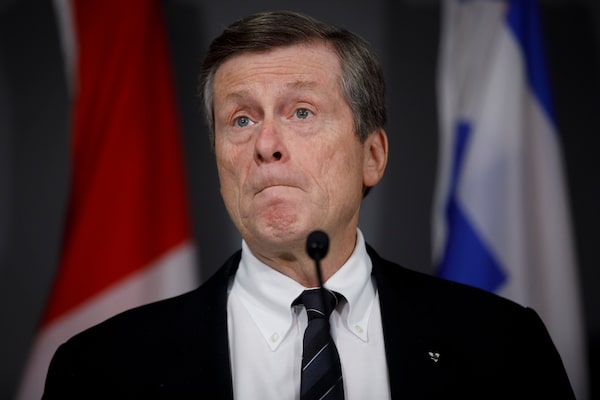
Toronto Mayor John Tory speaks during a news conference in Toronto on Feb. 29, 2020.Cole Burston/The Canadian Press
Toronto mayor John Tory said on Friday that he will seek a third term, arguing that he can provide continuity and stable leadership at city hall.
The 67-year-old former broadcaster and executive, a veteran Conservative insider, had long been expected to run again. If he is re-elected and completes his term, he will become the longest-serving mayor in Toronto’s history, bucking a wave of turnover in the top political jobs at other cities across the country.
Polls have already shown that he will be a formidable candidate in the Oct. 24 municipal election. Other potential mayoral candidates had been waiting to see if he would run before announcing their own bids.
Mr. Tory will be running in an election he had promised not to contest.
During his first successful campaign for mayor, in 2014, he pledged repeatedly that he would run only twice, usually adding a joke to the effect that his wife would kill him otherwise. Shortly before the 2018 election, he began backing away from that promise. Throughout his current term, he has dropped regular hints about extending his time in office.
In an interview Friday, Mr. Tory said his pledge not to run again was a personal commitment to his wife, Barbara Hackett, and not a formal commitment to the citizens of Toronto. And Ms. Hackett, he said, has now given her blessing to a third term.
“The people will get to decide about this and how important it is to them,” he said. “I think they’ll decide in favour of having continuity of steady leadership.”
While he can point to achievements on affordable housing and transit over his two terms in office, the picture of the city’s progress over the course of his mayoralty is not clear-cut.
Living in Toronto has become increasingly expensive since the start of his first term. Although this is largely due to factors beyond any mayor’s control, the trend has made the city less attractive to some. And the public-transit file has been taken over by the provincial government, whose decisions don’t always match the priorities at city hall.
Matti Siemiatycki, a professor at the University of Toronto’s School of Cities, thinks Mr. Tory could also be vulnerable on road-safety issues. The city’s “Vision Zero” plan, which aims to eliminate traffic deaths and serious injuries, has made only halting progress since it launched in 2016.
“There have continued to be issues around safety and people getting seriously injured and killed on the roads,” Prof. Siemiatycki said.
“And you know, it has been the community that has held the mayor accountable on this, because there have continued to be these horrific and tragic incidents. Every time one of these happens, it shows that our city has not gone as far or as fast as is needed to get to zero.”
The city is also facing great challenges as the pandemic recedes. The downtown economy is still struggling, with fewer workers commuting to their offices. The local transit system is bleeding vast amounts of money, as ridership remains low. Toronto’s population dropped in the 12 months ending last summer, albeit by a small amount.
Mr. Tory would not offer any ideas about how a third term might differ in direction or vision from the first two. He said specific policy promises would have to wait until the campaign begins formally, in May.
“A lot of what needs to be done is to get done what has been started,” he said, listing as examples transit construction, housing affordability and expanding the city’s economy.
Mr. Tory’s references to steady leadership hint at a key question for voters: are today’s challenges best met by continuity, or does overcoming them require a new leader at city hall? In a number of Canadian cities, this has been a time of leadership change. Incumbent mayors in Calgary, Edmonton, Winnipeg, Ottawa and other places have all recently decided not to run again.
“I think the challenges here are much bigger and more complex than elsewhere,” Mr. Tory said.
“I think that people will be looking to make sure that, in the face of whether it’s financial challenges, housing challenges, you know, economic challenges – that they have someone here who can forge the partnerships, who can exercise the discipline and who can provide the leadership necessary to get the city into that recovery we talk about that’s stronger than ever.”
York University political scientist Dennis Pilon thinks Mr. Tory might benefit from the fact that the pandemic is higher on the public’s priority list than municipal politics. City hall no longer dominates the news cycle the way it did during the tenure of scandal-plagued former mayor Rob Ford.
“People’s energies are elsewhere right now,” Prof. Pilon said. “It’s like, okay, the guy’s got control of his job. You know, he’s looking after the store, there doesn’t appear to be any fires, great. I got enough to worry about right now.”
Our Morning Update and Evening Update newsletters are written by Globe editors, giving you a concise summary of the day’s most important headlines. Sign up today.
 Oliver Moore
Oliver Moore